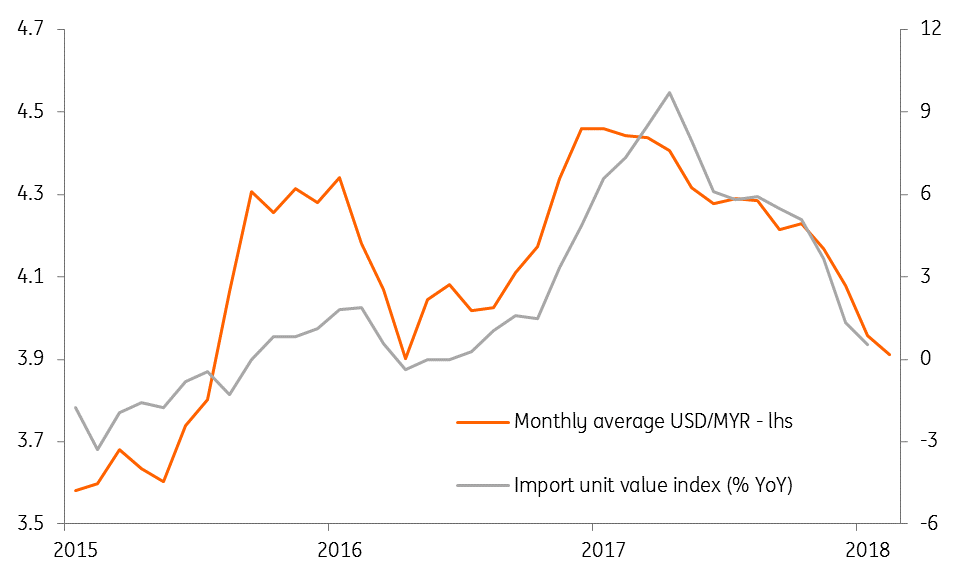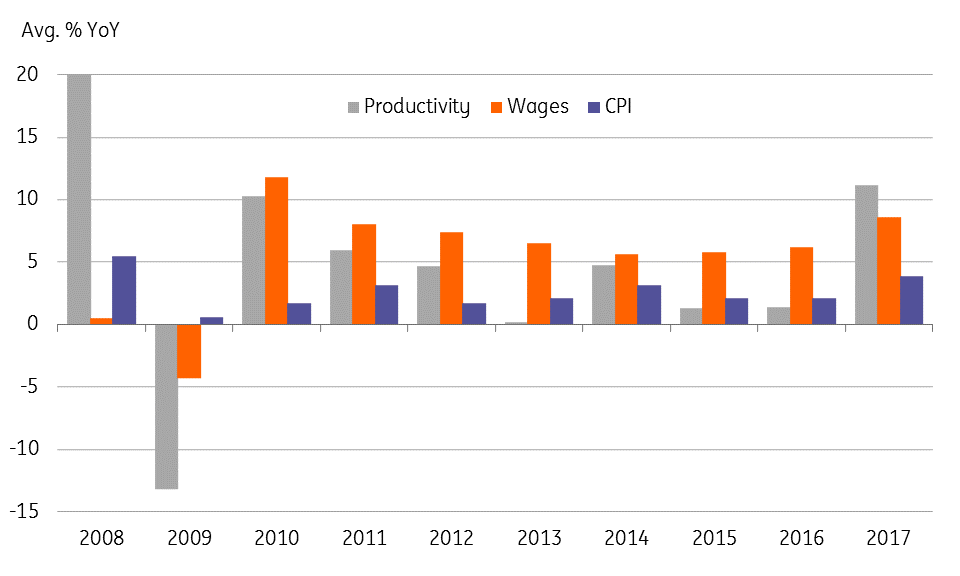Malaysia: Inflation misses estimates, again
Based on strong growth and benign inflation trends, we still look for Malaysia's central bank, Bank Negara Malaysia, to raise rates later this year
| 1.4% |
CPI inflation in FebruaryYear-on-year |
| Lower than expected | |
Food, housing, transport drag inflation lower
Malaysia’s consumer price inflation slowed more than expected to 1.4% year-on-year in February from 2.7% in January (consensus 1.9%, ING forecast 1.7%). It’s no surprise that the food and transport CPI components continued to slow, thanks to the favourable base effects in both. Lower housing prices also helped despite seasonal quarterly hikes in rentals in the last month. Core inflation, which strips out food and fuel-related components from the total CPI, also slowed to 1.8% in February from 2.2% in January.
Among other inflation drivers, steadily falling inflation of import prices reflects the impact of continuing strength of the Malaysian ringgit (MYR) whereas the impact of rapid growth in domestic wages on consumer prices continues to be muted.
Strong currency, low imported inflation

Tight labour market has no impact on inflation
The tight labour market with wage growth outpacing productivity growth since September could be potentially inflationary. Or, it may not be. 2017 was the first year in almost a decade in which annual average wage growth slowed below productivity growth and yet inflation accelerated (see chart). History teaches us that the supply-side push to prices, especially in food and fuel sectors, is more dominant than demand-side pressures in driving Malaysia’s inflation. Without any such supply shocks from food or oil prices, inflation will not be a concern throughout 2018.
Productivity, wages and inflation

Policy mix remains positive for Malaysian ringgit
Based on strong growth and benign inflation trends, we still look for Malaysia's central bank, Bank Negara Malaysia, to raise rates later this year, once the elections are out of the way. The macro policy mix of tightening monetary and loose fiscal policy is favourable for the Malaysian ringgit (MYR) to sustain its position among Asia’s outperformers this year. The MYR’s 3.3% year-to-date appreciation against the US Dollar is the second-best among Asian currencies. Our end-2018 USD/MYR forecast is 3.72 (spot 3.92, consensus 3.83).
Download
Download article
22 March 2018
Good MornING Asia - 22 March 2018 This bundle contains {bundle_entries}{/bundle_entries} articles"THINK Outside" is a collection of specially commissioned content from third-party sources, such as economic think-tanks and academic institutions, that ING deems reliable and from non-research departments within ING. ING Bank N.V. ("ING") uses these sources to expand the range of opinions you can find on the THINK website. Some of these sources are not the property of or managed by ING, and therefore ING cannot always guarantee the correctness, completeness, actuality and quality of such sources, nor the availability at any given time of the data and information provided, and ING cannot accept any liability in this respect, insofar as this is permissible pursuant to the applicable laws and regulations.
This publication does not necessarily reflect the ING house view. This publication has been prepared solely for information purposes without regard to any particular user's investment objectives, financial situation, or means. The information in the publication is not an investment recommendation and it is not investment, legal or tax advice or an offer or solicitation to purchase or sell any financial instrument. Reasonable care has been taken to ensure that this publication is not untrue or misleading when published, but ING does not represent that it is accurate or complete. ING does not accept any liability for any direct, indirect or consequential loss arising from any use of this publication. Unless otherwise stated, any views, forecasts, or estimates are solely those of the author(s), as of the date of the publication and are subject to change without notice.
The distribution of this publication may be restricted by law or regulation in different jurisdictions and persons into whose possession this publication comes should inform themselves about, and observe, such restrictions.
Copyright and database rights protection exists in this report and it may not be reproduced, distributed or published by any person for any purpose without the prior express consent of ING. All rights are reserved.
ING Bank N.V. is authorised by the Dutch Central Bank and supervised by the European Central Bank (ECB), the Dutch Central Bank (DNB) and the Dutch Authority for the Financial Markets (AFM). ING Bank N.V. is incorporated in the Netherlands (Trade Register no. 33031431 Amsterdam).